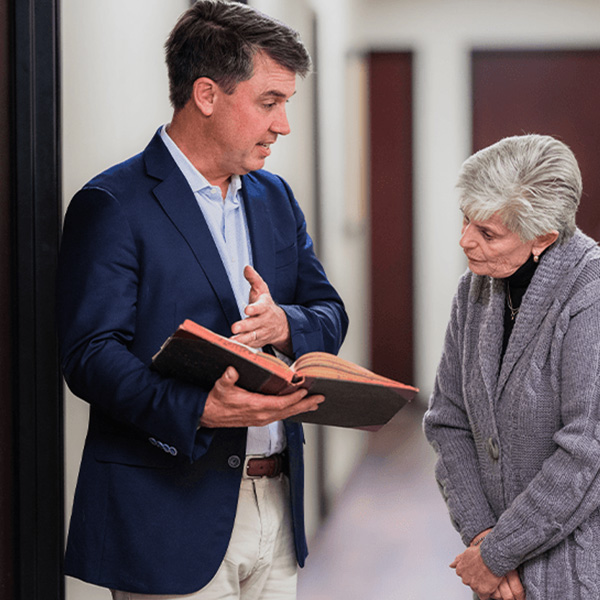Elopement Injury
Kansas City, Missouri, and Arkansas Nursing Home Elopement Lawyers
Nursing Home Resident Injuries & Death From Wandering Off, Escaping, or Leaving Unsupervised
Did nursing home staff members fail to supervise and care for your elderly loved one, allowing them to elope or wander off or around the premises alone? Did the moments of wandering result in your loved one being injured or losing their life?
If so, you or your elderly loved one may be entitled to financial compensation. The Kansas City nursing home elopement attorneys at the Law Office of Tom Wagstaff Jr. can help your family hold the negligent nursing home or assisted living center liable. We believe that every resident in a nursing home deserves the best treatment and that any care that falls short of that is unacceptable.

Our Elopement Case Victories
Experience matters in legal cases, especially those with high stakes and complicated details like a nursing home elopement or wandering case. At the Law Office of Tom Wagstaff Jr., we have an established history of remarkable case results in Blue Springs, Kansas City and throughout Jackson County, MO.
A Few of Our Recent Wins for Nursing Home Wandering Lawsuits Include
A 75-year-old nursing home resident was left unattended, wandered away, and passed away as a result.
A 74-year-old assisted living resident with Alzheimer's exited the facility by herself and was found deceased 13 days later.
A 75-year-old residential care facility resident was able to leave the facility unattended and passed away as a result.
A 99-year-old nursing home resident left the center unattended and suffered facial and head injuries.
Award-Winning Results
$2 Million Nursing Home Elopement
$3 Million Nursing Home Elopement
What Is Elopement or Wandering Off?
When a nursing home resident is allowed to leave or wander the premises unattended, often without any staff being aware of it, it is called elopement. Elopement is a serious safety concern, as it can lead to residents wandering away from the facility, getting injured or lost, or encountering other dangerous situations.
Harm Caused by Residents Wandering Away
Wandering away from a nursing home center can be extremely dangerous depending on the location and design of the center. Hazards around the premises like steps, uneven pavement, and debris can lead to a serious slip-and-fall accident. Some of the most tragic cases of nursing home wandering involve an elderly resident who wanders into the street and is struck by traffic.
Why Does Elopement Happen?
While elopement is universally deemed unacceptable, not every instance results in physical harm to the resident. However, the potential risks and dangers associated with wandering off unsupervised underscore the importance of implementing comprehensive safety protocols and addressing the root causes of elopement within care settings. Nursing home elopement is a serious concern with the following causes:
Elderly individuals with conditions like dementia often experience wandering tendencies. This behavior can lead them to leave the premises without warning or supervision, putting themselves at risk.
Nursing homes may lack sufficient staffing or robust security measures, allowing residents more freedom to wander off unnoticed. Without proper oversight, it becomes easier for individuals to elope.
Residents may struggle to understand the rules or layout of the facility due to cognitive impairments or language barriers. This confusion can lead them to inadvertently wander away from the premises.
Emotional factors, such as longing for their former home or loved ones, can drive residents to attempt to leave the facility. Despite the care they receive, they may yearn for the familiarity and comfort of their previous environment.
Why Do Elderly Residents Wander Off?
Elderly residents may wander off for several reasons, often related to cognitive or physical conditions:
Individuals with dementia or Alzheimer's disease may wander due to confusion, disorientation, or a desire to return to a familiar place from their past. They may not recognize their surroundings or may have difficulty remembering where they are supposed to be.
Even without a specific diagnosis of dementia, memory loss associated with aging can contribute to wandering. Seniors may forget where they are going or become disoriented, leading them to wander off.
Certain medications prescribed for elderly individuals can have side effects such as confusion, dizziness, or disorientation, which may increase the risk of wandering.
Some elderly individuals may wander out of restlessness or boredom, especially if they are confined to a care facility or home environment for long periods without stimulation or social interaction.
Seniors may wander in search of basic needs such as food, water, or a restroom if they are not easily accessible or if the individual has difficulty communicating their needs.
Feelings of anxiety, agitation, or emotional distress can also prompt wandering behavior. This may be triggered by changes in the environment, feelings of loneliness, or unresolved emotional issues.
Pain or discomfort from physical ailments such as arthritis or urinary tract infections can lead to restlessness and wandering as individuals try to alleviate their discomfort.
Wandering may be driven by past routines or habits. For example, if an individual was accustomed to walking a certain route daily, they may continue to do so even if their circumstances have changed.
Changes in the physical environment, such as renovations or rearrangements of furniture, can cause confusion and disorientation, leading to wandering behavior.
Inadequate supervision or lack of appropriate security measures in care facilities or home environments can also contribute to wandering incidents among elderly residents.
Who Is Liable for Elopement?
Nursing homes and other care facilities have a duty to provide adequate supervision and security measures to prevent elopement and ensure the safety of their residents. This may include strategies such as electronic monitoring systems, secure exits, staff training on managing elopement risks, and individualized care plans for residents at risk of wandering. Liability for elopement in a nursing home is a complex legal issue that often requires a thorough investigation to determine who bears responsibility. Here are the common parties who could be held accountable for elopement:
The nursing home administration may be held liable if it can be proven that they were negligent in providing adequate supervision or security measures to prevent elopement. This could include factors such as inadequate staffing levels, failure to properly assess a resident's risk of elopement, or failure to implement appropriate security measures.
Individual staff members, such as nurses or aides, may also be held liable if they were directly responsible for supervising the resident at the time of elopement and failed to fulfill their duties. This could include instances where staff members were negligent in monitoring the resident or failed to take appropriate action to prevent the elopement.
In some cases, liability for elopement may extend to third parties if they contributed to the circumstances leading to the incident. For example, if a visitor or another resident facilitated the resident's elopement, they could potentially be held liable.
If the nursing home contracts with external security services or other contractors responsible for maintaining the facility's security, they may also share liability if it can be shown that they failed to fulfill their obligations.
Nursing homes are subject to regulations and standards set forth by federal and state authorities. Failure to comply with these regulations, particularly those related to resident safety and security, could result in liability for the nursing home.

Injuries and Consequences of Nursing Home Wandering
- Broken Bones
- Back Injuries and Paralysis
- Head and Brain Injuries (TBIs)
- Wrongful Death
If your loved one suffered a physical injury or death because their nursing home or assisted living facility failed to protect them from wandering off, the team at the Law Office of Tom Wagstaff Jr. is prepared to help you seek justice. Our nursing home elopement attorneys in Kansas City, Independence, MO and Arkansas have secured millions of dollars in compensation for victims of nursing home neglect and their families.
Schedule a no-cost consultation with our experienced nursing home elopement lawyers in Kansas City by calling 816-708-0524 or contacting us online.
